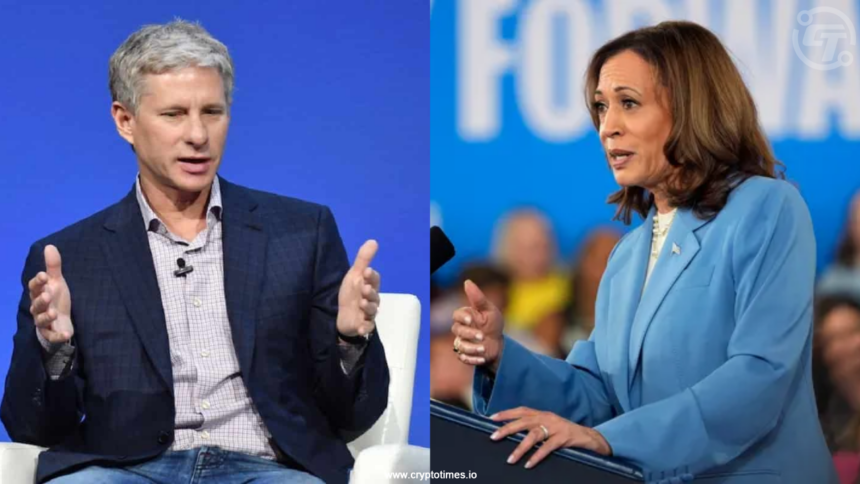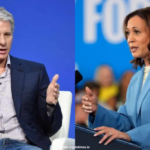In a bold move that bridges the worlds of politics and cryptocurrency, Ripple co-founder Chris Larsen has made headlines by donating $1 million worth of XRP to U.S. Vice President Kamala Harris. This donation not only signifies a significant show of support for Harris but also demonstrates the growing influence of cryptocurrency in mainstream political and financial spheres.
Who is Chris Larsen?
Chris Larsen is one of the key figures in the blockchain and cryptocurrency space. As a co-founder of Ripple Labs, the company behind the XRP cryptocurrency, Larsen has been a central force in driving the use of blockchain technology for cross-border payments. Ripple’s goal is to create faster, more efficient global payment systems, using XRP as a bridge currency for transferring value between fiat currencies.
Ripple has been a trailblazer in the financial technology world, working closely with banks, payment providers, and even regulators to integrate blockchain solutions into the global financial system.
Why This Donation Matters
1. Political Engagement of Crypto Leaders
The donation from Chris Larsen signals a significant milestone in the political engagement of cryptocurrency figures. Historically, cryptocurrencies and blockchain technology have operated somewhat independently from the traditional political establishment. However, with this donation, Larsen brings crypto into the political mainstream, emphasizing its growing importance in economic policy discussions.
The donation also underscores a growing relationship between crypto leaders and U.S. policymakers. As crypto assets like Bitcoin, Ethereum, and XRP gain traction, regulatory clarity becomes increasingly important. A closer alignment between politicians and crypto advocates could potentially pave the way for clearer legislation and regulation, ensuring that the U.S. remains a leader in the blockchain space.
2. XRP as a Form of Donation
Larsen’s donation of $1 million in XRP further legitimizes the role of cryptocurrency in philanthropy and political contributions. Unlike traditional cash or stock donations, using cryptocurrency demonstrates the flexibility, security, and efficiency of blockchain transactions. Moreover, donations made via crypto can be executed instantly and transparently, thanks to the decentralized nature of blockchain technology.
This is a significant moment for XRP, as well. Ripple has faced scrutiny from regulators, particularly the U.S. Securities and Exchange Commission (SEC), over whether XRP should be classified as a security. With this high-profile donation, Larsen is perhaps showcasing the utility of XRP as a legitimate currency for payments and transfers, further distancing it from the notion of being merely an investment asset.
3. The Role of Cryptocurrency in Campaign Finance
The donation also raises interesting questions about the role of cryptocurrency in campaign finance. Political contributions in the form of digital assets have been a growing trend in recent years, and as cryptocurrencies become more mainstream, they will likely play an even larger role in how candidates raise funds for their campaigns.
Cryptocurrencies like XRP offer several benefits in this context. For one, they provide a level of transparency and traceability that traditional payment methods may lack. Transactions on the blockchain are publicly recorded, which can help ensure accountability in campaign financing. Additionally, crypto donations make it easier for candidates to receive contributions from a global audience, expanding their donor base beyond national borders.
Ripple’s Regulatory Struggles: A Turning Point?
Larsen’s donation also comes at a pivotal time for Ripple. The company has been involved in a long-standing legal battle with the SEC, which accuses Ripple of conducting an unregistered securities offering through the sale of XRP. Despite these legal challenges, Ripple has continued to expand its operations globally, and XRP remains one of the top cryptocurrencies by market capitalization.
This high-profile donation might be part of a broader strategy by Ripple to align itself with policymakers who are open to pro-crypto regulation. As the SEC vs. Ripple case moves forward, having political allies like Harris, who has a significant influence on economic and tech policies, could be a game-changer for Ripple and the wider blockchain industry.
What’s Next for Crypto in Politics?
Chris Larsen’s donation may open the floodgates for other prominent figures in the crypto space to make political contributions. As more politicians become educated on the benefits and potential of blockchain technology, we may see more pro-crypto policies emerge. These policies could focus on regulatory clarity, innovation, and blockchain integration into governmental systems.
Vice President Kamala Harris, known for her progressive stance on technology and innovation, could potentially use her influence to push for a balanced regulatory framework that fosters growth while protecting consumers. As the U.S. continues to develop its digital asset policy, having advocates like Larsen on the political stage can only accelerate the adoption of blockchain technology.
Conclusion
Chris Larsen’s $1 million donation in XRP to Kamala Harris is more than just a generous political contribution—it’s a signal that cryptocurrency is gaining traction in political arenas. As blockchain technology continues to revolutionize global finance, its influence on politics is inevitable. This donation may well be the beginning of a deeper relationship between cryptocurrency advocates and policymakers, potentially shaping the future of both industries.
With regulatory clarity on the horizon and a growing acceptance of cryptocurrencies like XRP, the fusion of blockchain and politics is poised to become a transformative force in the coming years. Keep an eye on how this dynamic relationship evolves, as it will likely have far-reaching implications for the future of crypto and its role in shaping global policies.
ENG WANJIKU
Views: 4




